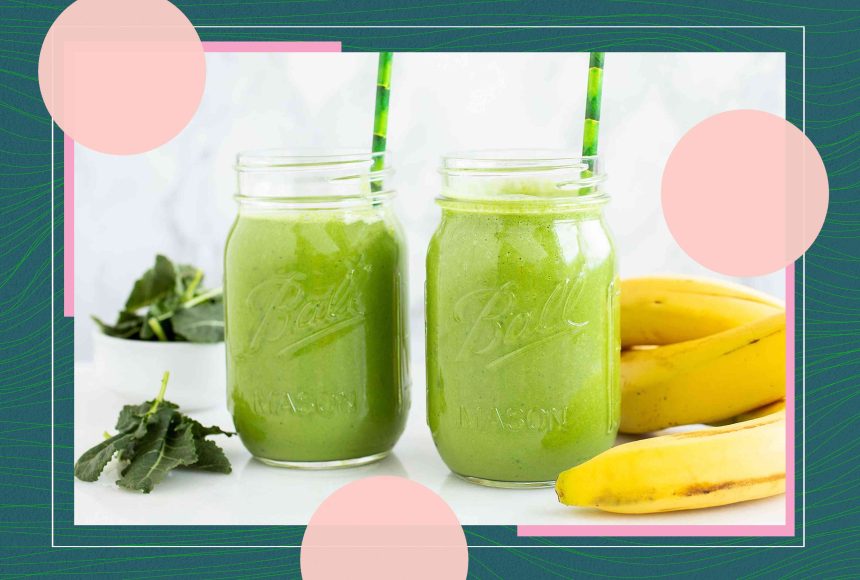As you age, you probably start paying more attention to your brain health, noticing that you don’t feel as sharp as you did a few years ago. And while doing puzzles and playing memory games can definitely help, what you eat can also make a huge impact. So when the afternoon slump comes, and your mind wanders to snack time, sipping on our high-fiber Kale & Banana Smoothie is a great thing to do for your cognitive health. (yep, smoothies aren’t just for breakfast)
“Focusing on brain health can significantly boost your quality of life as your brain controls everything from your mood and cognitive function to your body’s ability to self-regulate and maintain homeostasis. Good brain health is essential to overall mental, physical and emotional health and longevity,” says Josten Fish, RD, registered dietitian.
“By supporting brain health through nutrition and lifestyle choices, we can lead a fuller life and maintain cognitive functions into old age. It’s not just about longevity but about enhancing the quality of life at every age,” says Kathleen Benson, RD. Discover how this quick, tasty and nutritious snack can help you have a fuller life and vitality in your later years.
What Makes This Smoothie Great for Better Cognitive Health?
Fiber
Fiber is mostly known for its digestive benefits, helping you get your bathroom routine back on track. But this nutrient does much more than that. Some research has shown that a higher intake of dietary fiber may help improve specific components of cognitive function, including processing speed, sustained attention and working memory.
Kale and bananas contribute to this snack’s high-fiber content. One serving, approximately 2 cups, contains 4 grams of fiber, which is between 12 and 18% of the daily recommendation.
Vitamin D
The smoothie calls for milk and lets you choose between cow’s and non-dairy milk to suit your needs and preferences. Both options are good sources of vitamin D. One cup of reduced-fat milk provides 3 mcg of vitamin D, which is about 15% of your daily need. The Daily Value (DV) for vitamin D is 20 mcg (800 IU) for adults. Non-dairy milks vary in amount, but fairly all are fortified with vitamin D. For example, a cup of oat milk contains 4 mcg of vitamin D—20% of the DV.
Fish points out that vitamin D isn’t just a simple vitamin; it’s a hormone your brain can’t live without. “Vitamin D is a hormone that plays a role in brain development by enhancing mechanisms such as neurotransmitter synthesis and neurotrophin production,” says Fish. “It even stimulates glutathione, the most important antioxidant in the brain. Indirectly, vitamin D improves brain health by regulating melatonin, which promotes normal sleep patterns and, hence, better brain function.” Research shows that adequate vitamin D levels improve the blood-brain barrier and overall brain function.
Omega-3’s
Omega-3 fatty acids are more than a buzzword. Omega-3s are a group of polyunsaturated fatty acids that have been shown to positively impact many aspects of your health, including your cognitive function at all life stages. There are three main types of omega-3s—DHA, EPA and ALA. Together, these essential fats impact the function of neurotransmitters, allowing better blood flow to your brain, improving your memory and learning and supporting your overall cognitive well-being. And kale is the omega-3 star in this smoothie.
A 2022 study found that people with more omega-3s in their bloodstream had a bigger hippocampus, the part of your brain associated with learning and memory. In addition, eating foods high in omega-3s was associated with a better understanding of complex concepts and using abstract reasoning and logical thinking. Benson says, “The foods we eat play a role in how our brain functions; it’s about eating those [foods] that are rich in nutrients. This helps prevent brain fog and keeps our focus sharp. It’s helpful to include omega-rich foods which support brain health.”
Antioxidants & Flavonoids
Other ingredients in this smoothie—honey, fruit and veggies—are chock full of antioxidants. Benson says, “Kale, bananas and honey contain nutrients such as antioxidants and flavonoids that might support cognitive health by helping to reduce inflammation and combat oxidative stress. These processes are linked to general brain health and may contribute to better memory and function over time.”
Studies show that bananas have even more antioxidants than berries, and their bioactive compounds may help you fight off bacteria and viruses. Leafy greens like kale are famous for having high levels of phytonutrients like antioxidants that help reduce inflammation in the brain and body. “Eating foods that are high in nutrients, including antioxidants, minerals and polyphenols, can improve cognitive functions through a variety of processes. For example, a nutrient-dense diet can actually increase the production of neurons as well as improve the connection between the neurons,” says Fish.
Flavonoids—a type of antioxidant—give honey its flavor and aroma, and the great thing about them is that they’re also anti-inflammatory. “Honey has even been the focus of several studies on brain health and could be a potential brain booster due primarily to its antioxidant properties,” says Fish. A 2023 review that looked at 34 studies done on humans and animals found that honey may improve cognitive health in four main ways: lower stress, pain relieving benefits, a neuroprotective impact and a memory boost.
Other Foods for Better Cognitive Health
While this smoothie contains nutrient-dense foods packed with brain-supporting ingredients, plenty of other foods will help keep you sharp.
- Fish: If you’re looking for more omega-3 fatty acids to improve your cognition even more, fish is always a great choice. Fatty fish living in cold water have the highest omega-3 fatty acids. These include salmon, tuna, mackerel, sardines and herring.
- Mushrooms: Some mushrooms are grown under UV lights to increase their levels of vitamin D. In addition to brain-healthy vitamin D, mushrooms are high in antioxidants and other bioactive compounds. Studies are beginning to show that mushrooms might help improve age-related neurological diseases such as Alzheimer’s disease and dementia.
- Eggs: Eggs have a long list of brain-supporting nutrients, including choline, a nutrient needed for proper nervous system function. Eggs also contain several B vitamins, which may lower your risk of cognitive impairment by metabolizing and clearing away homocysteine. This amino acid can build up in the brain and cause problems. And a big plus: eggs even contain several other brain-supporting nutrients, such as vitamin D, omega-3s and antioxidants.
The Bottom Line
Adding brain-supporting nutritious foods will go a long way toward cognitive health. Make snack time fun and healthy with our tasty Kale & Banana Smoothie. With just five wholesome ingredients, it’s quick to whip up, and you’ll improve your brain health in a delicious way. Other healthy-brain foods include fish, eggs and mushrooms, among others. Benson offers a last word of advice, “It’s important to understand that while these foods can be part of a healthy diet, they’re not a cure-all, and their benefits should be viewed as part of a comprehensive approach to overall health.”







